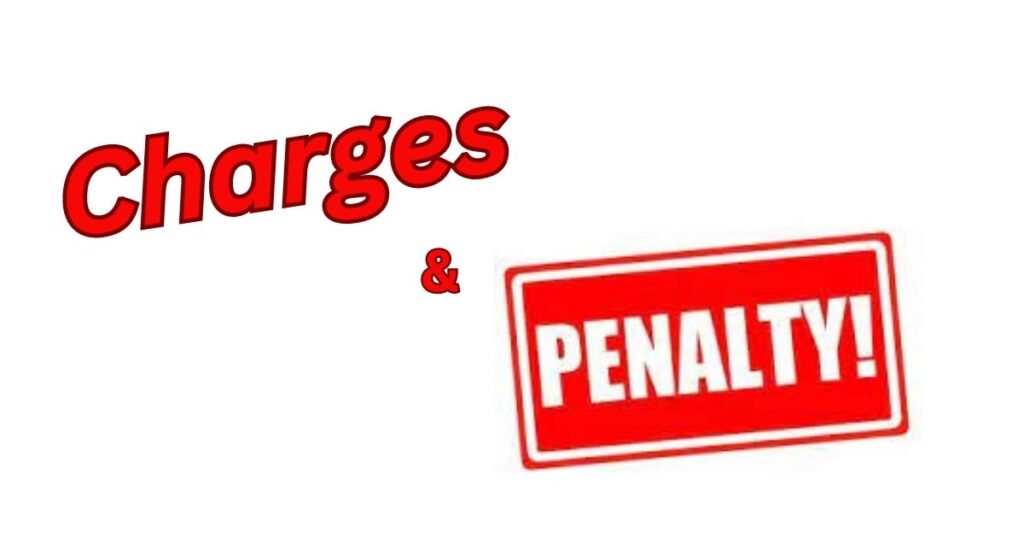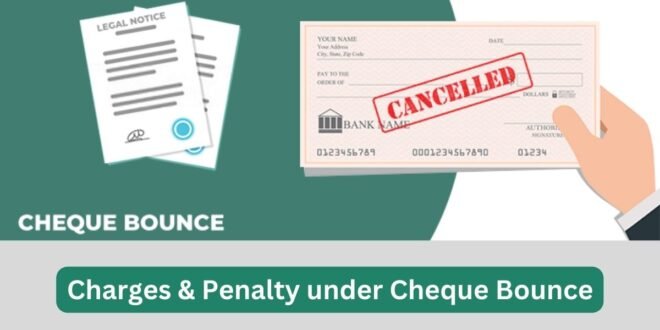Sometimes we encounter the inconvenient situation of our cheques getting bounced. Although it can occur due to trivial reasons, it often results in financial losses. In this article, we’ll discuss the possible consequences and penalties related to cheque bounce incidents.
Cheques serve as a convenient, secure, and widespread method for executing financial transactions such as fee payments, bill settlements, salary distributions, and loan repayments. The person with the bank account who issues the cheque is called the Drawer. While his/her bank is the Drawee. The individual to whom the payment is designated is known as the Payee.
Charges & Penalty under Cheque Bounce

cheque bounce is a serious offense under section 138 of the Negotiable Instruments Act, 1881. Considering the numerous cheques processed by banks daily, the penalties associated with cheque bouncing are quite stringent.
Reasons for the cheque dishonor in India
signature mismatch, insufficient funds in the account, discrepancies in the written numerical and word amounts, date overwriting on the cheque, expired or damaged cheques, doubt in cheque authenticity, account closure, suspicion of fraud by the bank, account number mismatch, and customer death.
Effects of cheque bounce on the customer
A customer may face legal implications if a cheque is bounced. The accused may have to pay a hefty penalty or may even face imprisonment. Additionally, it can adversely affect the person’s financial reputation.
1. The negative impact on the credit score
If a customer seeks a home loan but lacks adequate funds in their account, the processed amount may bounce. This can lead to immediate rejection of the loan. Frequent cheque bounce incidents can tarnish a person’s financial credit history, making it challenging to obtain loans in the future.
2. Restricted from traveling abroad
Because it is a criminal offense, the person can only travel abroad with court permission. Failure to attend court sessions consistently may lead the court to issue an arrest warrant.
3.Penalties for Cheque Bounce
Despite numerous reported cases of cheque bounce, many remain pending in court. The individual can lodge a complaint under section 138 of the Negotiable Instruments Act.
If found guilty, the individual could face up to two years in jail, a fine amounting to twice the value of the bounced cheque, or both. Banks have the authority to close accounts and withdraw cheque book facilities for repeated offenses. If more than one cheque bounces, the Payee can file separate cases for each dishonored cheque. If the defaulter acknowledges a genuine error, it can be rectified by paying a minor fine to the bank.
Conditions for initiating the prosecution
The cheque must be drawn by the Drawer and Drawee. It must be presented to the bank within three months or its validity, whichever is earlier. The payee should send a registered notice for further payment after the cheque bounces. If the payee fails to pay the amount within 30 days. From the receipt of the notice, action can be taken.
Who can file the case of cheque bounce?
The Payee files the case if a cheque bounces. However, in certain situations, cases can be handled through a power of attorney. The complaint will appear before a Magistrate for examination.
Recommended documents for filing the cheque bounce case
The required documents include a bank return memo stating the dishonoring of the cheque, the original bounced cheque, an affidavit, the complaint itself, and copies of receipts. A cheque bounce is a serious criminal offense that can result in up to 2 years of imprisonment, along with a fine twice the cheque amount.
Case Duration:
The extensive backlog of cases in India indicates the efficiency of our constitutional law. Closing a case generally takes around 1.5 years, provided the individual attends all hearings and presents sufficient evidence.
Read More Articles: Top Best Government Business Loan Schemes For MSMES and Startup




